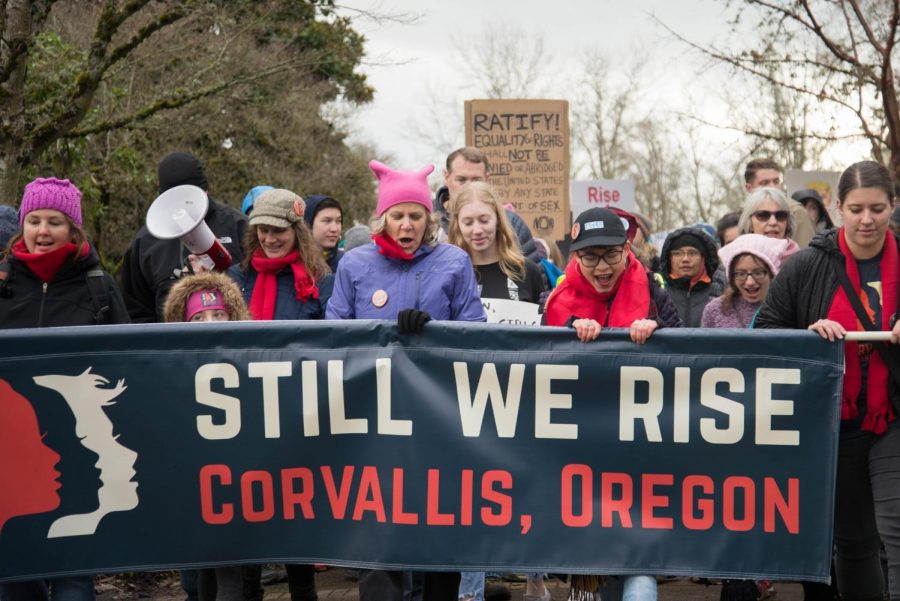Thousands marched through Corvallis in commemoration of Women’s March
January 22, 2018
In 1920, the 19th Amendment to the United States Constitution gave women the right to vote. In 1972, the U.S. Congress passed Title IX, prohibiting discrimination in any federally-funded education program or activity, based on an individual’s sex. In 2017, Merriam-Webster named feminism as their word of the year. On Saturday, Jan. 20, 2018, thousands of feminists marched through downtown Corvallis to commemorate the one year anniversary of the historic Women’s March.
Beginning in the Corvallis Central City Park, Mid-Willamette NOW, Corvallis Changemakers and the Corvallis-Albany Branch of the National Association for the Advancement of Colored People hosted the Still We Rise Women’s March. Large crowds dressed in pink “pussy hats” and colorful ensembles displayed signs decorated in feminist phrases such as “Respect Existence or Expect Resistance”, “Women rights are human rights” and “Embrace diversity and kindness”.
The event began with seven public speakers, with the Senior Vice President of the Shelley Moon Corvallis-Albany Branch of the NAACP kicking it off.
“There can be no peace without justice and no justice without peace,” Moon said. “Without the awakened heart, you have neither one.”
Following the speakers, Raging Grannies took the stage to familiarize the crowd at Central Park on the chants that would be shouted during the march. These chants covered topics of women’s rights, as well as several other social issues like Deferred Action for Childhood Arrivals and LGBTQIA+ rights. Such chants included “No hate, no fear, immigrants are welcome here“ and “Love, not hate, that’s what makes America great “.
Priscila Narcio, an OSU student advocate for DACA Dreamers and march participant, she was happy to see such a large turnout for the event.
“It was awesome that so many people showed up and that they’re all here for this cause,” Narcio said. “I was really happy to see people holding up ‘Pass the DREAM Act’.”
March participant and Facilitator of Corvallis Trans Support Ada-Rhodes Short expressed that her reasoning for participating in the event was to bring visibility to the issues that trans individuals face that the cis community may not be informed about.
“Two of our biggest concerns are food instability and housing insecurity, which a lot of people just are like, ‘Oh, those aren’t trans issues,’ and I’m like, ‘Oh my God, they are’,” Short said. “So we run a community pantry that provides free food to trans people who need extra food. We have a community closet that collects and distributes clothing to people. And then we are also working on trying to directly combat housing discrimination, which is something I have personally faced this last year.”
Also in attendance of the march was Taryn Bazurto, Benton County Indivisible facilitator. According to Bazurto, President Donald Trump’s administration is uniquely set against democratic norms and individuals cannot allow this any further. Bazurto’s organization, Indivisible, assists in teaching others how to personally contact members of the government, how to hold them accountable for their actions and decisions and how to remind them that they ultimately are public servants working for the better good of the public.
“If they forget that, we will outvote them, we will vote them out of office and we will run for office,” Bazurto said.
As a member of a third generation military family, Bazurto recognizes that citizenry does not just mean signing up for the military.
“It means voting. It means going out there for issues you care about. It means going out there for issues you care about. It means protecting vulnerable populations,” Bazurto said. “And for some of us, we felt like the election (of Trump) was a slap, like, ‘How could this be?’ and you can either pick yourself up off the mat and do something or keep crying. So we got up and said, ‘Let’s try’.”
According to Kryn Freehling-Burton, senior instructor in the women, gender and sexuality studies program at Oregon State University, not all forms of activism are shown through actions like marching, but through kindness and help to the surrounding community. Staff and faculty members at OSU are taking the initiative to take part in these forms of activism on campus.
“We’re starting a food pantry on our floor of Waldo (Hall) because of food insecurity and money. The challenges of just financial security to even pay for things like that or to have food throughout the whole month, that is also activism,” Freehling-Burton said. “Recognizing a need that exists right here on our campus, right here with students in our programs and the school of Language, Culture and Society. We’ve said this is a priority, this is a way we can be there for people who need something, that is another example (of activism).”
Furthermore, according to Freehling-Burton, such kindness and support exists not just at OSU, but in public schools and online on social media.
“And some of that is activism, some of that is just connection and community building, which can also be activism,” Freehling-Burton said. “Activism just continues to raise awareness.”










































































































